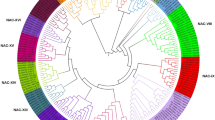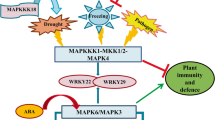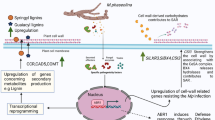Abstract
Calcium-dependent protein kinases (CDPKs) play significant roles in response to environmental stresses in plants. However, the CDPK gene family in pear (Pyrus bretschneideri Rehd) has not been thoroughly explored. In this study, we performed a comprehensive analysis of CDPK family genes in pear, and 30 CDPK genes were identified, unevenly distributed across 13 chromosomes, and predicted to be mainly localized at the plasma membrane. Based on phylogenetic analysis and structural features, the PbCDPKs were classified into four distinct subfamilies. In addition, many putative cis-acting elements responsive to hormones and environmental stresses were identified in the promoter regions. According to RNA-seq data, the majority of PbCDPK genes showed differential expression in different pear tissues. After inoculation of plants with the fungus Venturia nashicola, four PbCDPK genes were differentially expressed in resistant and susceptible pear cultivars, suggesting that they might play an important role in resistance to the pear scab pathogen. These candidate genes will be subjected to disease resistance and functional analysis in future work. Our results thus provide a genome-wide characterization of CDPK family genes in pear and lay the foundation for further functional analysis.






Similar content being viewed by others
Data availability
All data used and analyzed during this research are included in this article and its additional files. The pear genome database used during the current study are available on the website (http://gigadb.org/search/new?keyword=Pyrus).
References
Almadanim MC, Alexandre BM, Rosa MTG, Sapeta H, Leitão AE, Ramalho JC, Lam TT, Negrão S, Abreu IA, Oliveira MM (2017) Rice calcium-dependent protein kinase OsCPK17 targets plasma membrane intrinsic protein and sucrose-phosphate synthase and is required for a proper cold stress response. Plant Cell Environ 40:1197–1213. https://doi.org/10.1111/pce.12916
Artimo P, Jonnalagedda M, Arnold K et al (2012) ExPASy: SIB bioinformatics resource portal. Nucleic Acids Res 40:W597–W603. https://doi.org/10.1093/nar/gks400
Asano T, Tanaka N, Yang G, Hayashi N, Komatsu S (2005) Genome-wide identification of the rice calcium-dependent protein kinase and its closely related kinase gene families: comprehensive analysis of the CDPKs gene family in rice. Plant Cell Physiol 46:356–366. https://doi.org/10.1093/pcp/pci035
Bailey TL, Johnson J, Grant CE, Noble WS (2015) The MEME suite. Nucleic Acids Res 43:W39–W49. https://doi.org/10.1093/nar/gkv416
Bouche N, Yellin A, Snedden WA, Fromm H (2005) Plant-specific calmodulin-binding proteins. Annu Rev Plant Biol 56:435–466. https://doi.org/10.1146/annurev.arplant.56.032604.144224
Boudsocq M, Sheen J (2013) CDPKs in immune and stress signaling. Trends Plant Sci 18:30–40. https://doi.org/10.1016/j.tplants.2012.08.008
Boudsocq M, Willmann MR, McCormack M, Lee H, Shan L, He P, Bush J, Cheng SH, Sheen J (2010) Differential innate immune signalling via Ca(2+) sensor protein kinases. Nature 464:418–422. https://doi.org/10.1038/nature08794
Bundó M, Coca M (2017) Calcium-dependent protein kinase OsCPK10 mediates both drought tolerance and blast disease resistance in rice plants. J Exp Bot 68:2963–2975. https://doi.org/10.1093/jxb/erx145
Cai H, Cheng J, Yan Y, Xiao Z, Li J, Mou S, Qiu A, Lai Y, Guan D, He S (2015) Genome-wide identification and expression analysis of calcium-dependent protein kinase and its closely related kinase genes in Capsicum annuum. Front Plant Sci 6:737. https://doi.org/10.3389/fpls.2015.00737
Chen C, Chen H, Zhang Y, Thomas HR, Frank MH, He Y, Xia R (2020) TBtools: an integrative toolkit developed for interactive analyses of big biological data. Mol Plant 13:1194–1202. https://doi.org/10.1016/j.molp.2020.06.009
Cheng SH, Willmann MR, Chen HC, Sheen J (2002) Calcium signaling through protein kinases. The Arabidopsis calcium-dependent protein kinase gene family. Plant Physiol 129:469–485. https://doi.org/10.1104/pp.005645
Choi ED, Kim GH, Park SY, Hoon Song J, Lee YS, Jung JS, Koh YJ (2019) Genetic diversity of the pear scab fungus Venturia nashicola in Korea. Mycobiology 47:76–86. https://doi.org/10.1080/12298093.2019.1572263
Coca M, San Segundo B (2010) AtCPK1 calcium-dependent protein kinase mediates pathogen resistance in Arabidopsis. Plant J 63:526–540. https://doi.org/10.1111/j.1365-313X.2010.04255.x
Crizel RL, Perin EC, Vighi IL, Woloski R, Seixas A, da Silva PL, Rombaldi CV, Galli V (2020) Genome-wide identification, and characterization of the CDPK gene family reveal their involvement in abiotic stress response in Fragaria × ananassa. Sci Rep 10:11040. https://doi.org/10.1038/s41598-020-67957-9
Dammann C, Ichida A, Hong B, Romanowsky SM, Hrabak EM, Harmon AC, Pickard BG, Harper JF (2003) Subcellular targeting of nine calcium-depenent protein kinase isoforms from Arabidopsis. Plant Physiol 132:1840–1848. https://doi.org/10.1104/pp.103.020008
Ding C, Lei L, Yao L et al (2019) The involvements of calcium-dependent protein kinases and catechins in tea plant [Camellia sinensis (L.) O. Kuntze] cold responses. Plant Physiol Biochem 143:190–202. https://doi.org/10.1016/j.plaphy.2019.09.005
Fantino E, Segretin ME, Santin F, Mirkin FG, Ulloa RM (2017) Analysis of the potato calcium-dependent protein kinase family and characterization of StCDPK7, a member induced upon infection with Phytophthora infestans. Plant Cell Rep 36:1137–1157. https://doi.org/10.1007/s00299-017-2144-x
Feng J, Huang Y, Lu J (2019) Cloning, subcellular localization, and expression analysis of VvRING1a from grapevine. Hortic Environ Biotechnol 60:733–739. https://doi.org/10.1007/s13580-019-00165-1
Fu L, Yu X, An C (2014) OsCPK20 positively regulates Arabidopsis resistance against Pseudomonas syringae pv. tomato and rice resistance against Magnaporthe grisea. Acta Physiol Plant 36:273–282. https://doi.org/10.1007/s11738-013-1408-5
Gao X, He P (2013) Nuclear dynamics of Arabidopsis calcium-dependent protein kinases in effector-triggered immunity. Plant Signal Behav 8:e23868. https://doi.org/10.4161/psb.23868
Gao X, Chen X, Lin W et al (2013) Bifurcation of Arabidopsis NLR immune signaling via Ca2+-dependent protein kinases. PLoS Pathog 9:e1003127. https://doi.org/10.1371/journal.ppat.1003127
Gao W, Xu FC, Guo DD et al (2018) Calcium-dependent protein kinases in cotton: insights into early plant responses to salt stress. BMC Plant Biol 18:15. https://doi.org/10.1186/s12870-018-1230-8
Gromadka R, Cieśla J, Olszak K, Szczegielniak J, Muszyńska G, Polkowska-Kowalczyk L (2018) Genome-wide analysis and expression profiling of calcium-dependent protein kinases in potato (Solanum tuberosum). Plant Growth Regul 84:303–315. https://doi.org/10.1007/s10725-017-0341-9
Guerra T, Schilling S, Hake K, Gorzolka K, Sylvester FP, Conrads B, Westermann B, Romeis T (2019) Calcium-dependent protein kinase 5 links calcium signaling with N-hydroxy-L-pipecolic acid-and SARD1-dependent immune memory in systemic acquired resistance. New Phytol 225:310–325. https://doi.org/10.1111/nph.16147
Hamel LP, Sheen J, Séguin A (2014) Ancient signals: comparative genomics of green plant CDPKs. Trends Plant Sci 19:79–89. https://doi.org/10.1016/j.tplants.2013.10.009
Hettenhausen C, Yang DH, Baldwin IT, Wu J (2013) Calcium-dependent protein kinases, CDPK4 and CDPK5, affect early steps of jasmonic acid biosynthesis in Nicotiana attenuata. Plant Signal Behav 8:e22784. https://doi.org/10.4161/psb.22784
Hou J, Li C, Cheng Y, Jiang C, Li Y, Ge Y, Li J (2021) Roles of calcium-dependent protein kinases mediated reactive oxygen species homeostasis in inducing resistance of apples by acibenzolar-S-methyl. Food Chem 346:128881. https://doi.org/10.1016/j.foodchem.2020.128881
Huang ZC, Li H (2020) Effect of virus inducible cis-element insertion on transcription properties of improved GWSF promoter in Arabidopsis thaliana. Biol Plantarum 64:320–323. https://doi.org/10.32615/bp.2020.032
Jiang Y, Guo L, Liu R, Jiao B, Zhao X, Ling Z, Luo K (2016) Overexpression of poplar PtrWRKY89 in transgenic Arabidopsis leads to a reduction of disease resistance by regulating defense-related genes in salicylate- and jasmonate-dependent signaling. PLoS ONE 11:e0149137. https://doi.org/10.1371/journal.pone.0149137
Kang M, Lee S, Abdelmageed H, Reichert A, Lee HK, Fokar M, Mysore KS, Allen RD (2017) Arabidopsis stress associated protein 9 mediates biotic and abiotic stress responsive ABA signaling via the proteasome pathway. Plant Cell Environ 40:702–716. https://doi.org/10.1111/pce.12892
Kumar S, Stecher G, Tamura K (2016) MEGA7: molecular evolutionary genetics analysis version 7.0 for bigger datasets. Mol Biol Evol 33:1870–1874. https://doi.org/10.1093/molbev/msw054
Lee HJ, Lee JH, Lee SG, An S, Lee HS, Choi CK, Kim SK (2019) Foliar application of biostimulants affects physiological responses and improves heat stress tolerance in Kimchi cabbage. Hortic Environ Biotechnol 60:841–851. https://doi.org/10.1007/s13580-019-00193-x
Leebens-Mack JH, Barker MS, Carpenter EJ et al (2019) One thousand plant transcriptomes and the phylogenomics of green plants. Nature 574:679–685. https://doi.org/10.1038/s41586-019-1693-2
Lescot M, Déhais P, Thijs G, Marchal K, Moreau Y, Van de Peer Y, Rouzé P, Rombauts S (2002) PlantCARE, a database of plant cis-acting regulatory elements and a portal to tools for in silico analysis of promoter sequences. Nucleic Acids Res 30:325–327. https://doi.org/10.1093/nar/30.1.325
Li Y, Fei X, Dai H, Li J, Zhu W, Deng X (2019) Genome-wide identification of calcium-dependent protein kinases in chlamydomonas reinhardtii and functional analyses in nitrogen deficiency-induced oil accumulation. Front Plant Sci 10:1147. https://doi.org/10.3389/fpls.2019.01147
Liu Y, Wang Y, Li J, Li L (2019) Responses of intracellular Ca2+ and its sensors to Venturia nashicola infection in pear (Pyrus bretschneideri) with differing resistance. Sci Hortic-Amsterdam 243:552–558. https://doi.org/10.1016/j.scienta.2018.09.010
Liu H, Duo H, Zhao D, Sun E, Ma F, Ma C, Zuo C (2020) Identification of CRK gene family in pear and its members in response to signals of Valsa pyri. Acta Hortic 47:963–973. https://doi.org/10.16420/j.issn.0513-353x.2019-0759
Livak KJ, Schmittgen TD (2001) Analysis of relative gene expression data using real-time quantitative PCR and the 2(-delta delta C(T)) method. Methods 25:402–408. https://doi.org/10.1006/meth.2001.1262
Luan S (2009) The CBL-CIPK network in plant calcium signaling. Trends Plant Sci 14:37–42. https://doi.org/10.1016/j.tplants.2008.10.005
Luan S, Kudla J, Rodriguez-Concepcion M, Yalovsky S, Gruissem W (2002) Calmodulins and calcineurin B-like proteins: calcium sensors for specific signal response coupling in plants. Plant Cell 14:S389–S400. https://doi.org/10.1105/tpc.001115
Matschi S, Werner S, Schulze WX, Legen J, Hilger HH, Romeis T (2013) Function of calcium-dependent protein kinase CPK28 of Arabidopsis thalianain plant stem elongation and vascular development. Plant J 73:883–896. https://doi.org/10.1111/tpj.12090
Myers C, Romanowsky SM, Barron YD et al (2009) Calcium-dependent protein kinases regulate polarized tip growth in pollen tubes. Plant J 59:528–539. https://doi.org/10.1111/j.1365-313X.2009.03894.x
Niu X, Guan Y, Chen S, Li H (2017) Genome-wide analysis of basic helix-loop-helix (bHLH) transcription factors in Brachypodium distachyon. BMC Genom 18:619. https://doi.org/10.1186/s12864-017-4044-4
Ormancey M, Thuleau P, Mazars C, Cotelle V (2017) CDPKs and 14-3-3 proteins: emerging duo in signaling. Trends Plant Sci 22:263–272. https://doi.org/10.1016/j.tplants.2016.11.007
Pan J, Zhang X, Liu F, Wang Q, Li Y (2010) Oat-agar culture and rDNA-ITS sequence analyses of the plasmodium of Physarum melleum in Myxomycetes. Mycosystema 29:893–896. https://doi.org/10.3724/SP.J.1238.2010.00516
Pan L, Zhao X, Chen M, Fu Y, Xiang M, Chen J (2019) Effect of exogenous methyl jasmonate treatment on disease resistance of postharvest kiwifruit. Food Chem 305:125483. https://doi.org/10.1016/j.foodchem.2019.125483
Park SY, Jeon MJ, Ma SH, Wahlsteen E, Amundsen K, Kim JH, Suh JK, Chang JS, Joung YH (2019) Phylogeny and genetic variation in the genus Eranthis using nrITS and cpIS single nucleotide polymorphisms. Hortic Environ Biotechnol 60:239–252. https://doi.org/10.1007/s13580-018-0113-0
Ranty B, Aldon D, Cotelle V, Galaud JP, Thuleauet P, Mazars C (2016) Calcium sensors as key hubs in plant responses to biotic and abiotic stresses. Front Plant Sci 7:327. https://doi.org/10.3389/fpls.2016.00327
Ray S, Agarwal P, Arora R, Kapoor S, Tyagi AK (2007) Expression analysis of calcium-dependent protein kinase gene family during reproductive development and abiotic stress conditions in rice (Oryza sativa L. ssp. indica). Mol Genet Genom 278:493–505. https://doi.org/10.1007/s00438-007-0267-4
Schulz P, Herde M, Romeis T (2013) Calcium-dependent protein kinases: hubs in plant stress signaling and development. Plant Physiol 163:523–530. https://doi.org/10.1104/pp.113.222539
Shu B, Jue D, Zhang F, Zhang D, Liu C, Wu Q, Luo C (2020) Genome-wide identification and expression analysis of the citrus calcium-dependent protein kinase (CDPK) genes in response to arbuscular mycorrhizal fungi colonization and drought. Biotechnol Biotec Eq 34:1304–1314. https://doi.org/10.1080/13102818.2020.1837011
Sigrist CJ, de Castro E, Cerutti L, Cuche BA, Hulo N, Bridge A, Bougueleret L, Xenarios I (2013) New and continuing developments at PROSITE. Nucleic Acids Res 41:D344–D347. https://doi.org/10.1093/nar/gks1067
Tang J, Lin J, Li H, Li X, Yang Q, Cheng ZM, Chang Y (2016) Characterization of CIPK family in Asian pear (Pyrus bretschneideri Rehd) and co-expression analysis related to salt and osmotic stress responses. Front Plant Sci 7:1361. https://doi.org/10.3389/fpls.2016.01361
Tong X, Cao A, Wang F, Chen X, Xie S, Shen H, Jin X, Li H (2019) Calcium-dependent protein kinase genes in Glycyrrhiza Uralensis appear to be involved in promoting the biosynthesis of glycyrrhizic acid and flavonoids under salt stress. Molecules 24:1837. https://doi.org/10.3390/molecules24091837
Valmonte GR, Arthur K, Higgins CM, MacDiarmid RM (2014) Calcium-dependent protein kinases in plants: evolution, expression and function. Plant Cell Physiol 55:551–569. https://doi.org/10.1093/pcp/pct200
Verde I, Abbott AG, Scalabrin S et al (2013) The high-quality draft genome of peach (Prunus persica) identifies unique patterns of genetic diversity, domestication and genome evolution. Nat Genet 45:487–494. https://doi.org/10.1038/ng.2586
Wang Q, Yin X, Chen Q, Xiang N, Sun X, Yang YQ, Yang YP (2017) Genome-wide survey indicates diverse physiological roles of the turnip (Brassica rapa var. rapa) calcium-dependent protein kinase genes. Sci Rep 7:15803. https://doi.org/10.1038/s41598-017-16102-0
Wei M, Ni W, Zhu L, Cai B, Wang S (2015) Ca2+ redistribution and expression of MdCPK in apple leaves infected by Alternaria alternata apple pathotype. Acta Hortic 42:2113–2122. https://doi.org/10.16420/j.issn.0513-353x.2015-0362
Wei M, Wang S, Dong H, Cai B, Tao J (2016) Characterization and comparison of the CPK gene family in the apple (Malus × domestica) and other rosaceae species and its response to Alternaria alternata infection. PLoS ONE 11:e0155590. https://doi.org/10.1371/journal.pone.0155590
Wen F, Ye F, Xiao Z, Liao L, Li T, Jia M, Liu X, Wu X (2020) Genome-wide survey and expression analysis of calcium-dependent protein kinase (CDPK) in grass Brachypodium distachyon. BMC Genom 21:53. https://doi.org/10.1186/s12864-020-6475-6
Wu J, Wang Z, Shi Z et al (2013) The genome of the pear (Pyrus bretschneideri Rehd.). Genome Res 23:396–408. https://doi.org/10.1101/gr.144311.112
Xie M, Huang Y, Zhang YP, Wang X, Yang H, Yu O, Dai WH, Fang CB (2013) Transcriptome profiling of fruit development and maturation in Chinese white pear (Pyrus bretschneideri Rehd). BMC Genom 14:823. https://doi.org/10.1186/1471-2164-14-823
Yang YX, Ahammed GJ, Wu C, Fan SY, Zhou YH (2015) Crosstalk among jasmonate, salicylate and ethylene signaling pathways in plant disease and immune responses. Curr Protein Pept Sci 16:450–461. https://doi.org/10.2174/1389203716666150330141638
Ye S, Wang L, Xie W, Wan B, Li X, Lin Y (2009) Expression profile of calcium-dependent protein kinase (CDPKs) genes during the whole lifespan and under phytohormone treatment conditions in rice (Oryza sativa L. ssp. indica). Plant Mol Biol 70:311–325. https://doi.org/10.1007/s11103-009-9475-0
Yip Delormel T, Boudsocq M (2019) Properties and functions of calcium-dependent protein kinases and their relatives in Arabidopsis thaliana. New Phytol 224:585–604. https://doi.org/10.1111/nph.16088
Yu Z, Duan X, Luo L, Dai S, Ding Z, Xia G (2020) How plant hormones mediate salt stress responses. Trends Plant Sci 25:1117–1130. https://doi.org/10.1016/j.tplants.2020.06.008
Zhang K, Han YT, Zhao FL, Hu Y, Gao YR, Ma YF, Zheng Y, Wang YJ, Wen YQ (2015) Genome-wide identification and expression analysis of the CDPK gene family in grape Vitis Spp. BMC Plant Biol 15:164. https://doi.org/10.1186/s12870-015-0552-z
Zhang H, Wei C, Yang X et al (2017) Genome-wide identification and expression analysis of calciumdependent protein kinase and its related kinase gene families in melon (Cucumis melo L.). PLoS ONE 12:e0176352. https://doi.org/10.1371/journal.pone.0176352
Zhao L, Ding Q, Zeng J, Wang FR, Zhang J, Fan SJ, He XQ (2012) An improved CTAB-ammonium acetate method for total RNA isolation from cotton. Phytochem Anal 23:647–650. https://doi.org/10.1002/pca.2368
Zhao P, Liu Y, Kong W, Ji J, Cai T, Guo Z (2021) Genome-wide identification and characterization of calcium-dependent protein kinase (CDPK) and CDPK-related kinase (CRK) gene families in Medicago truncatula. Int J Mol Sci 22:1044. https://doi.org/10.3390/ijms22031044
Zuo R, Hu R, Chai G, Xu M, Qi G, Kong Y, Zhou G (2013) Genome-wide identification, classification, and expression analysis of CDPK and its closely related gene families in poplar (Populus trichocarpa). Mol Biol Rep 40:2645–2662. https://doi.org/10.1007/s11033-012-2351-z
Acknowledgements
The authors thank all contributors to this research for their help. This research was financially supported by the National Pear Industry Technology Research System of China (Grant No. CARS-29-05), and the National Key Research and Development Plan of China (Grant No. 2018YFD0201407), and the Local Funds for Scientific and Technological Development from Central Government (Grant No. YDZJSX2022A042).
Author information
Authors and Affiliations
Contributions
SL contributed by methodology, data curation, writing the manuscript. JL contributed by checking the experimental data. NL contributed to the manuscript editing. PZ contributed by methodology. LL contributed by conceptualization, supervision, manuscript editing. All authors have read and approved the final manuscript.
Corresponding author
Ethics declarations
Conflict of interest
The authors declare that they have no conflict of interest.
Ethical approval
This work does not contain any studies with human participants or animals performed by any of the authors.
Additional information
Communicated by Cecile Segonzac.
Publisher's Note
Springer Nature remains neutral with regard to jurisdictional claims in published maps and institutional affiliations.
Supplementary Information
Below is the link to the electronic supplementary material.
Rights and permissions
Springer Nature or its licensor (e.g. a society or other partner) holds exclusive rights to this article under a publishing agreement with the author(s) or other rightsholder(s); author self-archiving of the accepted manuscript version of this article is solely governed by the terms of such publishing agreement and applicable law.
About this article
Cite this article
Liu, S., Li, J., Li, N. et al. Genome-wide identification of calcium-dependent protein kinases (CDPKs) in pear (Pyrus bretschneideri Rehd) and characterization of their responses to Venturia nashicola infection. Hortic. Environ. Biotechnol. 63, 903–915 (2022). https://doi.org/10.1007/s13580-022-00444-4
Received:
Revised:
Accepted:
Published:
Issue Date:
DOI: https://doi.org/10.1007/s13580-022-00444-4




